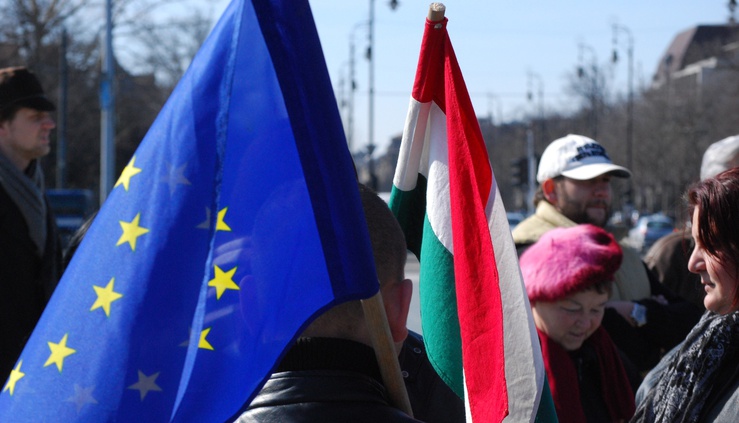
Understanding nationalist ideology in Hungary: 'enormous potential for violence'
Published on
Translation by:
 Andrew Christie
Andrew Christie
Victory in April’s elections is assured for the populist opposition party (Fidesz) and right-wing extremists (Jobbik). Magdalena Marsovszky, a Germano-Hungarian cultural scientist researching anti-semitism and right-wing extremism in Hungary, explains
The shift to the right in Hungarian politics is alarming. Despite a ban imposed in 2009, the paramilitary Hungarian Guard of the right-wing Jobbik party presses on through the country, stirring up hatred both against jews and the crimes of the Roma community in the name of the Great Nation of Hungary. Magdalena Marsovszky explains.
How is nationalist ideology defined in Hungary?
 Hungarian society may be described as a parallel society. There is a large nationalist side, and a smaller liberal, cosmopolitan and democratically-thinking side. Nationalism is first and foremost an organic, biological ideology which views the nation as an ethnically homogenous society. Secondly, it is an imperialistic ideology, as it also encompasses the ethnic Magyar minorities in neighbouring countries. That is to say, this ideology does not recognise Hungary’s current borders. There is also a revisionist ideology here, which depends on searching internally for concepts of an enemy in order to define itself. And, in Hungary, these foreigners are jews and 'gypsies'.
Hungarian society may be described as a parallel society. There is a large nationalist side, and a smaller liberal, cosmopolitan and democratically-thinking side. Nationalism is first and foremost an organic, biological ideology which views the nation as an ethnically homogenous society. Secondly, it is an imperialistic ideology, as it also encompasses the ethnic Magyar minorities in neighbouring countries. That is to say, this ideology does not recognise Hungary’s current borders. There is also a revisionist ideology here, which depends on searching internally for concepts of an enemy in order to define itself. And, in Hungary, these foreigners are jews and 'gypsies'.
Additionally, however, Hungarian anti-semitism in its current form isn’t always directed at actual jews, but at all those who fit anti-semitic stereotypes. That includes cosmopolitans and left-wing liberals, high society and the intelligentsia, and the sinful large cities. Anything that doesn’t meet with this nationalist ideology is labelled jewish. In this way, even the EU can be a society created by jews, when in fact it is heteronomous. The 'Tel Aviv-New York-Brussels axis' exists in right-wing circles in Hungary. An enormous potential for violence lurks behind nationalist ideology.
Where in society are the effects of this nationalist ideology felt?
Nationalism is present throughout all classes of Hungarian society. There are even nationalist housing estates. Sometimes you hear adverts say Only nationally-minded citizens should apply. There is even a taxi association calling itself Jobb-Taxi, which is closely affiliated with the radical right-wing Jobbik party. Its slogan goes: Nationally-minded citizens call us. The Magyars say Buy from us, which by the exclusion principle means 'Don’t buy from the jews'. Every summer, alongside the well-known Sziget festival, the far-right anti-festival Magyar Sziget ('Magyar Island') is held, which has a very strong following and sanctifies the nation. Nationalist ideology is also widespread in schools and the public–service media.

Jobbik won 14.7% of the vote in the 2009 European elections and is now in a position to make the jump into the Hungarian parliament. How has such an underground movement been able to evolve in recent years into a meaningful system?
Jobbik openly says what everyone is thinking, and what the majority of the press have been stirring up for years. Fidesz politicians stir these things up too, but they don’t act upon it. And now there is a new, revolutionary generation saying, We want to finally put into practice what our fathers motivated us to do. The journalist Attila Bujak once propounded the theory that Jobbik was invented by Fidesz. Following the election defeat in 2002, Bujak wrote that the former minister of the chancellory, István Stumpf, contended that Fidesz need a small party that is prepared to say to people that which the party can’t say out loud — after all, he claimed, Fidesz wants to remain a 'serious party'. After the election defeat, the Fidesz opposition leader and election favourite Viktor Orbán created so-called 'citizens’ circles', to which the Jobbik chairman Gábor Vona was also invited. Orbán is, so to speak, Vona's foster father. At that time, Vona was still a student and belonged to the university’s christian student union. Also, up until that point, no one yet considered Jobbik a far-right party. In the last local elections, it was very common for candidates to form coalitions with Jobbik. Only now, in the run-up to the election, are people distancing themselves.
Since the eastern bloc fell, has the European Union failed to help the new democracies in central and eastern Europe?
It is a categorical failure of the European Union that cultural politics was left in the hands of individual nations, and that there is still no European policy on culture and commemoration. One only need look at Slovakia, where a so-called patriotism act has just been passed. Similarly, Romania and Poland have nationalist tendencies. There is a psychological rift between east and west. It was expected that Europe would instigate cultural dialogue on a structural level: what is meant by the term 'nation', for example? It would have been advantageous to lay down the political meaning of the term 'nation', instead of consigning these countries to the morass of its ethnic meaning. Both sides have spoken about cultural politics and meant something different. In Hungary, it means 'nationalistic and Magyar'; in the west, 'democracy'. In the minds of the Hungarians, Trianon remains shocking even today, and it happened ninety years ago. Today, people still break down in tears because of it. Also, a socialist society doesn’t become democratic overnight — the free market was allowed in, but the syndicates were not stabilised, and they defend themselves based on ethnic arguments. Things are reverting to familiar old structures, based on the motto We, as Magyars, must defend ourselves. The EU did not help the newest member states learn democracy; that's a real sin.
Images: Hungarian guard movement ©daskar/ Flickr; anti-fascist demonstration ©Fabien Champion
Translated from Rechtsextremismus und völkisches Denken in Ungarn: "Ein irrsinniges Gewaltpotenzial"


